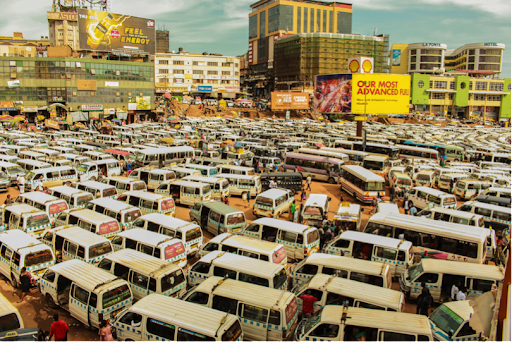Kampala, Uganda, grapples with severe air quality issues in the global landscape of growing cities. According to the World Health Organization (WHO), Kampala earned the dubious distinction of being one of the most polluted cities in the world in 2016.
WHO’s research revealed the presence of hazardous substances in the air, small enough to infiltrate the human bloodstream through the lungs, potentially causing 7 million premature deaths annually.
Cars at the Core: The Culprit Behind Kampala’s Air Pollution
Researchers attribute the lion’s share of air pollution in Kampala to car emissions. With the Uganda Revenue Authority (URA) estimating over 1 million cars in the country by 2019, Kampala bears the brunt of this vehicular pollution as the capital and major business center.
The city’s love affair with cars considered both a luxury and an asset, contributes to the escalating pollution crisis. Narrow roads exacerbate the problem, leading to extensive traffic jams, particularly during peak commuting hours in a city of 2 million people.
Aging Cars Amplify the Issue: Uganda’s Affection for Older Vehicles
In Uganda, a significant percentage of cars on the roads are older and used, purchased when they were more than 5 years from their date of manufacture. The allure of affordability makes importing such vehicles prevalent in the market.
However, to combat pollution, the Ugandan government imposed a ban on the importation of old cars in October 2018. The move aims to curb emissions from aging vehicles and reduce the overall number of cars contributing to air pollution.
Beyond Cars: Diverse Pollution Sources in Uganda
While the ban on old cars addresses a portion of the pollution problem, Uganda grapples with other sources of contamination. New industries spewing hazardous fumes into the air, pose a significant threat.
The government’s efforts to encourage electric vehicles, exemplified by the Kiira EVS, signal a shift toward cleaner transportation alternatives. However, industries and rural practices, such as bush burning and unpaved roads, also contribute to air pollution, necessitating a comprehensive regulatory approach.
A Call for Collective Responsibility
While government initiatives like the ban on old cars showcase a commitment to reducing pollution, citizens must embrace environmentally friendly practices. The energy to curb car emissions should be extended to regulate industries, educate rural populations on responsible practices, and invest in cleaner infrastructure.
Achieving a significant pollution reduction requires both governmental leadership and individual responsibility.
Original Article: http://populationgrowth.org/the-path-to-cleaner-air-is-a-halt-on-importing-old-cars-the-solution-to-ugandas-air-pollution-problem/




